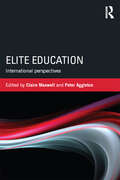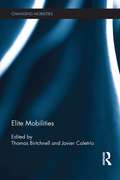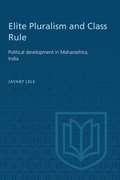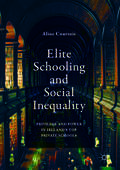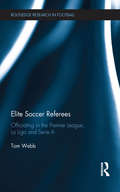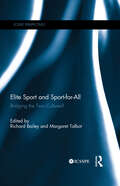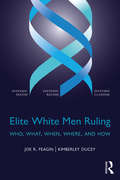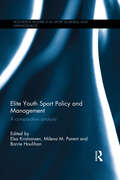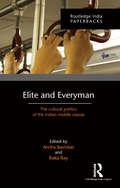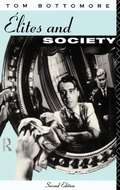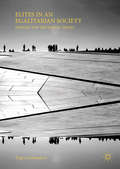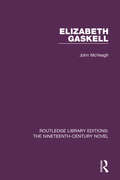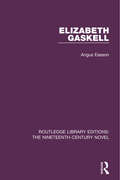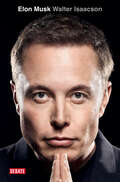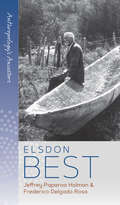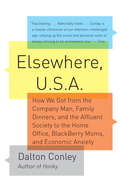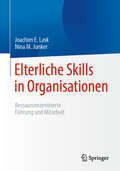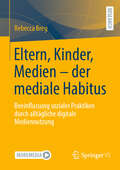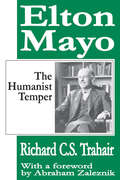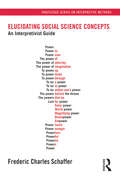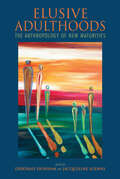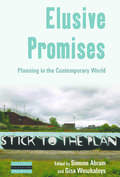- Table View
- List View
Elite Education: International perspectives
by Peter Aggleton Claire MaxwellElite Education – International Perspectives is the first book to systematically examine elite education in different parts of the world. Authors provide a historical analysis of the emergence of national elite education systems and consider how recent policy and economic developments are changing the configuration of elite trajectories and the social groups benefiting from these. Through country-level case studies, this book offers readers an in-depth account of elite education systems in the Anglophone world, in Europe and in the emerging financial centres of Africa, Asia and Latin America. A series of commentaries highlight commonalities and differences between elite education systems, and offer insights into broader theoretical issues, with which educationalists, researchers and policy makers are engaging . With authors including Stephen J. Ball, Donald Broady, Rubén Gaztambide-Fernández, Heinz-Hermann Krüger, Maria Alice Nogueira, Julia Resnik and Agnès van Zanten, the book offers a benchmark perspective on issues frequently glossed over in comparative education, including the processes by which powerful groups retain privilege and ‘elite’ status in rapidly changing societies. Elite Education – International Perspectives will appeal to policy makers and academics in the fields of education and sociology. Simultaneously it will be of special relevance to post-graduates enrolled on courses in the sociology of education, education policy, and education and international development.
Elite Mobilities (Changing Mobilities)
by Thomas Birtchnell Javier CaletríoSmall in number but great in influence, mobile elites have shaped the contours of global capitalism. Today these elites continue to flourish globally but in a changing landscape. The current economic crisis—and rising concerns about the moral legitimacy of extreme wealth—coincides with stern warnings over the risks posed by climate change and the unsustainable use of resources. Often an out-of-bounds topic in critical social science, elites are thought of as too inaccessible a group to interview and too variable a minority to measure. This groundbreaking collection sets out to challenge this perception. Through the careful examination of the movements of the one per cent through the everyday spaces of the ninety-nine per cent, Elite Mobilities investigates the shared zones elites inhabit alongside the commons: the executive lounge in the airport, the penthouse in the hotel, or the gated community next to the slum. Bringing together the pioneer scholars in critical sociology today, this collection explores how social scientists can research, map, and ‘track’ the flows and residues of objects, wealth and power surrounding the hypermobile. Elite Mobilities sets a new benchmark in social science efforts to research the powerful and the privileged. It will appeal to students and scholars interested in mobilities, transport, tourism, social stratification, class, inequality, consumption, and global environmental change.
Elite Parties, Poor Voters
by Tariq ThachilWhy do poor people often vote against their material interests? This puzzle has been famously studied within wealthy Western democracies, yet the fact that the poor voter paradox also routinely manifests within poor countries has remained unexplored. This book studies how this paradox emerged in India, the world's largest democracy. Tariq Thachil shows how arguments from studies of wealthy democracies (such as moral values voting) and the global south (such as patronage or ethnic appeals) cannot explain why poor voters in poor countries support parties that represent elite policy interests. He instead draws on extensive survey data and fieldwork to document a novel strategy through which elite parties can recruit the poor, while retaining the rich. He shows how these parties can win over disadvantaged voters by privately providing them with basic social services via grassroots affiliates. Such outsourcing permits the party itself to continue to represent the policy interests of their privileged base.
Elite Pluralism and Class Rule: Political development in Maharashtra, India (The Royal Society of Canada Special Publications)
by Jayant LeleBased on a study of recent political behaviour in a rural region of India, the author presents a critique of pluralist theories of democracy and advances a new approach to political sociology. Professor Lele insists that the politicians of Maharashtra sustain, however dispersed, a hegemonic class rule. The processes of development and modernization directly serve strategies of private gain through the public sphere; the elites continue to enclose the public sphere while propagating the myth of open competition. Case studies of local, state, and national politicans illustrate this behaviour and show how competition between powerful alliances is effectively moderated. The concluding section proposes a new comparative approach to political sociology. It demonstrates the inherent contradiction between domination and community, and argues for a historical analysis of the rise and fall of classes and ideologies. Professor Lele challenges the emphasis on modernization and instrumentality in contemporary social science, and suggests that the insights of Marx and Weber can lead to a more previse and universal framework for the study of societies.
Elite Schooling and Social Inequality
by Aline CourtoisThis book is the first significant sociological study of Ireland's elite private schools. It takes the reader behind the gates of these secretive institutions, and offers a compelling analysis of their role in the reproduction of social inequality in Ireland. From the selection process to past pupils' union events, from the dorms to the rugby pitch, the book unravels how these schools gradually reinforce exclusionary practices and socialize their students to power and privilege. It tackles the myths of meritocracy and classlessness in Ireland, while also providing keys to understanding the social practices and legitimacy of elites. By bringing out the voices of past pupils, parents and school staff and incorporating vivid ethnographic descriptions, the book provides a rare snapshot into a privileged world largely hidden from view. It offers a unique contribution to research on elite education as well as to the broader fields of sociology of education and inequality. As such, it will appeal to researchers, practitioners and the general public alike, in Ireland and beyond.
Elite Soccer Referees: Officiating in the Premier League, La Liga and Serie A (Routledge Research in Football)
by Tom WebbSoccer is undeniably the most popular sport in the world. While we know much about its high-profile players and their increasing wealth and global influence, we know little about referees and the ways in which refereeing has changed throughout the history of the sport. This book provides an in-depth exploration of the evolution of the match official. It presents a comparative analysis of elite Association football referees in England, Spain and Italy, as well as offering insights into the involvement of UEFA and FIFA in referee training. Drawing on archive material, the book documents the historical development of refereeing and sheds new light on the practice of elite refereeing in the present day. Including exclusive interviews with elite and ex-elite referees, as well as with professional soccer managers and members of the broadcast media, it considers the current role of match officials and the challenges and controversies they encounter. Elite Soccer Referees: Officiating in the Premier League, La Liga and Serie A is fascinating reading for all students and scholars with an interest in soccer, sport history, sport policy, sport management and the sociology of sport.
Elite Sport and Sport-for-All: Bridging the Two Cultures? (ICSSPE Perspectives)
by Margaret Talbot Richard BaileySport is often perceived as being divided into two separate domains: mass participation and elite . In many countries, policy and funding in these two fields are managed by separate agencies, and investment is often seen as a choice between the two. Elite Sport and Sport-for-All explores the points of connection and sources of tension between elite and mass participation sport. The book’s multi-disciplinary and international line-up of contributors seeks to define, examine, and develop solutions to this problematic relationship. Drawing on research and case studies from around the world—with examples from Denmark, Canada, South Africa and Israel—the book explores key contemporary issues including: does effective talent identification require depth of participation? do elite performances inspire greater participation? the role of the Paralympic movement in mass participation and elite sport; and the economic aspects of their co-existence. The first study of its kind, Elite Sport and Sport-for-All addresses a central dichotomy in sport policy and, as such, is important reading for all students, researchers, policy-makers or administrators working in sport development and policy.
Elite White Men Ruling: Who, What, When, Where, and How
by Joe R. Feagin Kimberley DuceyThis book examines the “who, what, when, where, and how” of elite-white-male dominance in U.S. and global society. In spite of their domination in the United States and globally that we document herein, elite white men have seldom been called out and analyzed as such. They have received little to no explicit attention with regard to systemic racism issues, as well as associated classism and sexism issues. Almost all public and scholarly discussions of U.S. racism fail to explicitly foreground elite white men or to focus specifically on how their interlocking racial, class, and gender statuses affect their globally powerful decisionmaking. Some of the power positions of these elite white men might seem obvious, but they are rarely analyzed for their extraordinary significance. While the principal focus of this book is on neglected research and policy questions about the elite-white-male role and dominance in the system of racial oppression in the United States and globally, because of their positioning at the top of several societal hierarchies the authors periodically address their role and dominance in other oppressive (e.g., class, gender) hierarchies.
Elite Youth Sport Policy and Management: A comparative analysis (Routledge Research in Sport Business and Management)
by Barrie Houlihan Milena M. Parent Elsa KristiansenElite youth sport competitions have increased significantly in number in recent years, with the Youth Olympic Games representing the high point of this phenomenon. This book examines the global context within which elite youth sport has emerged and continues to grow. It explores elite youth sport policy across fifteen countries, in Europe, the Americas, Africa and Asia, addressing the questions of how youth talent development is organised and why elite youth sport has become so popular. Taking a comparative global perspective, the book analyses the growth in more systematic approaches to young athlete development and the increasing emphasis on early talent identification. It discusses the attitude of stakeholders (such as NGBs, governments and sponsors) towards elite youth sport, while also considering how young elite athletes’ interests are protected and how the growth in elite youth sport affects a sport’s development strategy. Written by a team of internationally renowned researchers, Elite Youth Sport Policy and Management: A comparative analysis is fascinating reading for all students, scholars, managers, policy-makers and coaches with an interest in youth sport, elite sport development, talent identification and sports policy.
Elite and Everyman: The Cultural Politics of the Indian Middle Classes
by Editors Amita BaviskarThis book examines the middle classes — who they are and what they do — and their influence in shaping contemporary cultural politics in India. Describing the historical emergence of these classes, from the colonial period to contemporary times, it shows how the middle classes have changed, with older groups shifting out and new entrants taking place, thereby transforming the character and meanings of the category. The essays in this volume observe multiple sites of social action (workplaces and homes, schools and streets, cinema and sex surveys, temples and tourist hotels) to delineate the lives of the middle classes and show how middle-class definitions and desires articulate hegemonic notions of the normal and the normative.
Eliten und zivile Gesellschaft
by Helmut FehrIn dieser Studie werden Eliten in Ostmitteleuropa unter vergleichenden Gesichtspunkten untersucht. Das Spektrum der Eliten reicht von den kommunistischen Führungsgruppen bis zu neuen Machteliten und Gegeneliten, der Untersuchungszeitraum von 1968 bis 2013. Auf breiter empirischer Basis (ausführliche Interviews, Dokumente, Printmedien) beleuchtet der Autor den Elitenwandel in Polen, der Tschechischen Republik und der DDR/Ostdeutschland. Dabei geht es um ein tieferes Verständnis der Demokratisierung, der Elitenbildung und der Legitimitätskonflikte vor und nach den revolutionären Umbrüchen von 1989.
Elites and Society
by Tom BottomoreIn this substantially revised and enlarged second edition of a classic text that has been used throughout the world in numerous translations, Tom Bottomore reconsiders élite theory in the light of more recent studies. He examines the role and significance of élites in relation to classes and class structure in both advanced industrial and developing countries, and expounds the criticism of élites and élitism that have been formulated by democratic and socialist thinkers and movements. In a new concluding chapter, Professor Bottomore considers the prospect, as humanity approaches the millenium, for a renewed advance towards more egalitarian forms of society, in which all citizens would be able to participate more fully and effectively in the shaping of their social world. Tom Bottomore taught at the London School of Economics 1952-64, was Head of the Department of Political Science, Sociology and Anthropology at Simon Fraser University, Vancouver 1965-67, and Professor of Sociology at the University of Sussex 1968-85 where he is now Professor Emeritus. He is the author of numerous books, most recently: Theories of Modern Capitalism, Allen and Unwin (1985); Classes in Modern Society, Routledge (2nd edition, 1991) and Between Marginalism and Marxism: The Economic Sociology of J A Schumpter, Harvester Wheatsheaf (1992).
Elites in an Egalitarian Society: Support for the Nordic Model
by Trygve GulbrandsenBased on two unique survey studies of elites in Norway, this book examines whether elite attitudes towards central national issues have changed in the wake of international and national events and developments since 2000. The chapters examine elite integration and relations between elites and citizens in Norway as a means to discuss the continued viability of the Nordic welfare state model. This insight into how elites relate to central issues in Norwegian society and how they look upon citizens’ political interest and competence in general, will be of interest to academics within sociology and political science, as well as journalists and commentators and policy makers.
Elizabeth Gaskell (Routledge Library Editions: The Nineteenth-Century Novel #26)
by John McVeaghFirst published in 1970, this study demonstrates both the range and essential unity of the works of Mrs. Gaskell. The author analyses the novels of social criticism, the biography of Charlotte Brontë and the novels of country life as distinct expressions of her genius, commenting on recurrent themes, typical methods of presentation and consistent attitudes as they appear in each of the works. The differences of subject and intention between the three kinds of writing will be seen in the extracts which indicate the range of her ability and interests. The final section summarises her range and success and failure. This book will be of interest to students of literature and sociological history.
Elizabeth Gaskell: Electronic Edition (Routledge Library Editions: The Nineteenth-Century Novel #11)
by Angus EassonFirst published in 1979, this book looks at every aspect of the life and work of Elizabeth Gaskell, including her lesser known novels and writings — especially those concerning life in the industrial north of Victorian England. It shows how her work springs from a culture and society which pervades all she thought and wrote. An opening chapter explores her religion, culture, friendships and family. The major works are considered in turn and background material relevant to the novels’ industrial scenes is presented. The process of literary creation is charted in material drawn from letters and by examination of the manuscripts. Her short stories, journalism and letters are also considered.
Elon Musk (edición en español)
by Walter IsaacsonDel autor de Steve Jobs y otras grandes biografías, todas ellas éxitos internacionales de ventas, esta es la historia asombrosamente íntima del innovador más fascinante y polémico del mundo, un visionario que ha roto todos los moldes y ha conducido al mundo a la era de los vehículos eléctricos, la exploración espacial privada y la inteligencia artificial. Ah, y el mismo que compró Twitter.Cuando Elon Musk era un niño en Sudáfrica, sufría a menudo acoso escolar. Un día un grupo de niños lo empujó por unas escaleras de hormigón y le patearon hasta que su cara se hinchó como una pelota. Pasó una semana en el hospital. Pero las cicatrices físicas fueron insignificantes comparadas con las emocionales, las que le había causado su padre, un canalla, ingeniero carismático y fantasioso. Cuando Elon llegó a casa tras ser dado de alta del hospital, su padre le reprendió. «Tuve que escucharlo durante una hora mientras me gritaba, me llamaba idiota y me decía que era un inútil», recuerda. El impacto psicológico que su padre le causó perduró. Se convirtió en un joven fuerte pero vulnerable al mismo tiempo, propenso a bruscos cambios de humor -a lo Jekyll y Hyde-, con una gran tolerancia al riesgo, ansias de drama, un épico sentido de misión y una intensidad maníaca, cruel y a veces destructiva.A principios de 2022, después de un año marcado por el lanzamiento de treinta y un satélites de SpaceX, la venta de un millón de coches de Tesla y de convertirse en el hombre más rico de la tierra, Musk confesó con arrepentimiento su impulso por provocar el drama. «Necesito cambiar mi forma de pensar para que deje de estar en modo crisis, como lo he estado en los últimos catorce años, o probablemente toda mi vida», explicó.Fue un comentario melancólico, no un propósito de año nuevo. Cuando hizo la promesa, estaba comprando en secreto acciones de Twitter, el patio de recreo por excelencia. Con los años, cuando se encontraba en un momento difícil, se veía transportado de nuevo al acoso que sufrió en el patio del colegio. Ahora tenía la oportunidad de poseerlo. Durante dos años, Isaacson fue la sombra de Musk, asistió a sus reuniones, recorrió juntos sus fábricas, y pasó horas entrevistándolo a él, a su familia, amigos, compañeros y adversarios. El resultado es un relato íntimo y revelador, repleto de historias asombrosas, triunfos y perturbaciones, que aborda la pregunta: ¿son los demonios que mueven a Musk también lo que se necesita para impulsar la innovación y el progreso?
Elsdon Best (Anthropology's Ancestors)
by Jeffrey Paparoa Holman Frederico Delgado RosaNew Zealander ethnographer, Elsdon Best is a key figure in the history of anthropology due to his involuntary triggering of a fundamental and long-lasting anthropological debate on the Māori concept of hau. This volume is dedicated to this important scholar, who at the same time was shadowed by metropolitan anthropology and became an excluded ancestor, along with his Māori interlocutors and ethnographic collaborators. By recentering his place as one of anthropology’s ancestors, the volume contributes to a new perception of the discipline’s past.
Elsewhere, U.S.A.
by Dalton ConleyOver the past three decades, our daily lives have changed slowly but dramatically. Boundaries between leisure and work, public space and private space, and home and office have blurred and become permeable. InElsewhere, U. S. A. , acclaimed sociologist Dalton Conley connects our day-to-day experiences with occasionally overlooked sociological changes, from women's increasing participation in the labor force to rising economic inequality among successful professionals. In doing so, he provides us with an X-ray view of our new social reality.
Elterliche Skills in Organisationen: Ressourcenzentrierte Führung und Mitarbeit
by Joachim E. Lask Nina M. JunkerElterliche Skills in Organisationen - Ressourcenzentrierte Führung und Mitarbeit Basierend auf aktuellen wissenschaftlichen Erkenntnissen verdeutlicht „Elterliche Skills in Organisationen“, wie sich Organisationen und jeder Einzelne die aus der Elternrolle erworbenen Kompetenzen ressourcenorientiert nutzbar machen können. Denn es ist nachgewiesen, dass zahlreiche Ähnlichkeiten zwischen der Elternrolle und der Rolle als Mitarbeitende und Führungskräfte bestehen. Dadurch kann beachtlicher gegenseitiger Kompetenzerwerb ermöglicht werden. Wie dies möglich ist, welche Skills für Führungskräfte besonders relevant sind und wie der positive Transfer der Kompetenzen aus der Elternrolle unterstützt und für die Tätigkeit im Unternehmen noch besser eingesetzt werden kann, erfahren Sie in diesem Buch. Zielgruppen: Führungskräfte, HRM-Fachleute, Coaches, TrainerInnen, PsychologInnen, WirtschaftswissenschaftlerInnen, sowie Eltern. Zu den Autoren: Dipl.-Psych. Joachim E. Lask, Wirtschafts- und Familien-Psychologe und Leiter des WorkFamily-Instituts, berät Organisationen und forscht zum Work-Family Enrichment. Dr. Nina M. Junker, Associate Professor an der University of Oslo, ist Arbeits- und Organisationspsychologin. Sie forscht und publiziert unter Berücksichtigung sozialpsychologischer Konzepte seit vielen Jahren zur Schnittstelle von Beruf und Privatleben.
Eltern, Kinder, Medien - der mediale Habitus: Beeinflussung sozialer Praktiken durch alltägliche digitale Mediennutzung
by Rebecca BregIn diesem Buch wird das Mediennutzungsverhalten von Heranwachsenden (11–15 Jahre) im Zusammenhang mit sozialer Herkunft und habituellen Mustern empirisch untersucht. Mithilfe von Fragebögen und Interviews wird die digitale Mediennutzung von Schüler*innen an Mittelschulen und Gymnasien verglichen. Die Ergebnisse zeigen, dass mediale Praktiken durch familiäre Strukturen, das soziale Umfeld und kulturelles Kapital beeinflusst werden. Die Untersuchung hebt Unterschiede im digitalen Nutzungsverhalten hervor, die sich in Zugangsmöglichkeiten, elterlicher Begleitung und der Mediennutzung im Alltag zeigen. Während Schüler*innen aus privilegierten Verhältnissen digitale Medien gezielt für Schule und Freizeit nutzen, steht bei sozioökonomisch schwächeren Heranwachsenden oft die Unterhaltung im Vordergrund. Das Konzept des Habitus zeigt, wie soziale Praktiken die Mediennutzung prägen. Digitale Medien sind eng mit sozioökonomischen Strukturen verknüpft. Das Buch liefert wertvolle Erkenntnisse für Eltern, Pädagog*innen und politische Entscheidungsträger*innen, um digitale Kompetenz und Chancengleichheit nachhaltig zu fördern.
Elternschaft als Othering: Zur Subjektivation von Paaren als Eltern eines Kindes mit Behinderung (Subjektivierung und Gesellschaft/Studies in Subjectivation)
by Judith TröndleDie Studie widmet sich der Erforschung doppelerwerbstätiger Paare, deren Kind als ‚behindert‘ markiert wurde. Paararrangements werden in ihrer paargeschichtlichen und interaktiven Dynamik rekonstruiert, wobei deutlich wird, gegenüber welchen Widerständen ein solches Modell der doppelten Erwerbstätigkeit behauptet werden muss. Gesellschaftliche Barrieren wirken entlang der Differenzlinien Behinderung und Geschlecht intersektional. Sie werden jedoch unsichtbar durch die Verlagerung in den privaten Raum, innerhalb dessen sie durch partnerschaftliche Arbeitsteilung beantwortet werden. Es steht dabei weniger die vermeintlich ‚besondere’ Gruppe im Fokus der Analyse, als Prozesse der Besonderung, Adressierung und Subjektivation als ‚andere Eltern’. Die Subjektivation eines Paares als ‚Eltern eines Kindes mit Behinderung’ beschränkt zugleich Chancen der (An-)Erkennbarkeit als Paar sowie als Individuum. Sie trägt zudem zur Reproduktion vergeschlechtlichter Sorgearrangements bei und verdeutlicht gesellschaftliche Prozesse der Grenzziehung und Bedingungen von (An-)Erkennbarkeit.
Elton Mayo: The Humanist Temper
by Abraham Zaleznik Richard C. TrahairThe definitive biography of the life and work of Elton Mayo (1880-1949) is the first full, accurate account of the activities and intimate life of one of Australia and America's pioneering social scientists. Mayo, who established the scientifi c study of organizational behavior, was highly infl uential in American social science and business management theory, following his work at the Harvard Business School and the Western Electric Company.
Elucidating Social Science Concepts: An Interpretivist Guide (Routledge Series on Interpretive Methods)
by Frederic Charles SchafferConcepts have always been foundational to the social science enterprise. This book is a guide to working with them. Against the positivist project of concept "reconstruction"—the formulation of a technical, purportedly neutral vocabulary for measuring, comparing, and generalizing—Schaffer adopts an interpretivist approach that he calls "elucidation." Elucidation includes both a reflexive examination of social science technical language and an investigation into the language of daily life. It is intended to produce a clear view of both types of language, the relationship between them, and the practices of life and power that they evoke and sustain. After an initial chapter explaining what elucidation is and how it differs from reconstruction, the book lays out practical elucidative strategies—grounding, locating, and exposing—that help situate concepts in particular language games, times and tongues, and structures of power. It also explores the uses to which elucidation can be put and the moral dilemmas that attend such uses. By illustrating his arguments with lively analyses of such concepts as "person," "family," and "democracy," Schaffer shows rather than tells, making the book both highly readable and an essential guide for social science research.
Elusive Adulthoods: The Anthropology of New Maturities
by Deborah Durham and Jacqueline SolwayEssays on the changing meanings of adulthood in places around the world: “An important collection that furthers anthropological work on life stages.” —Susan Reynolds Whyte, author of Generations in Africa: Connections and ConflictsElusive Adulthoods examines why, in recent years, complaints about an inability to achieve adulthood have been heard in societies around the world.By exploring the changing meaning of adulthood in Botswana, China, Sudan, Papua New Guinea, Russia, Sri Lanka, Uganda, and the United States, contributors to this volume pose the problem of “What is adulthood?” and examine how the field of anthropology has come to overlook this meaningful stage in its studies.Through these case studies we discover different means of recognizing the achievement of adulthood, such as through negotiated relationships with others, including grown children, and as a form of upward class mobility. We also encounter the difficulties that come from a sense of having missed full adulthood, instead jumping directly into old age in the course of rapid social change, or a reluctance to embrace the stability of adulthood and necessary subordination to job and family. In all cases, the contributors demonstrate how changing political and economic factors form the background for generational experience and understanding of adulthood, which is a major focus of concern for people around the globe as they negotiate changing ways of living.
Elusive Promises
by Simone Abram Gisa WeszkalnysPlanning in contemporary democratic states is often understood as a range of activities, from housing to urban design, regional development to economic planning. This volume sees planning differently-as the negotiation of possibilities that time offers space. It explores what kind of promise planning offers, how such a promise is made, and what happens to it through time. The authors, all leading anthropologists, examine the time and space, creativity and agency, authority and responsibility, and conflicting desires that plans attempt to control. They show how the many people involved with planning deal with the discrepancies between what is promised and what is done. The comparative essays offer insight into the expected and unexpected outcomes of planning (from visionary utopias to bureaucratic dystopia or something in-between), how the future is envisioned at the outset, and what actual work is done and how it affects people's lives.
